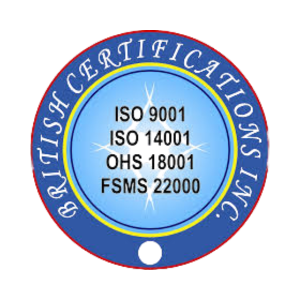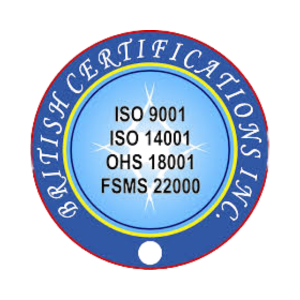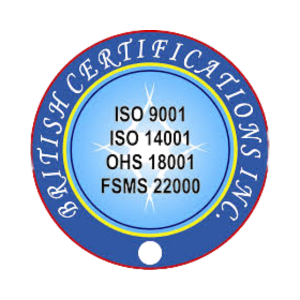Amla
Latin Name: Phyllanthus emblica/ Emblica officinalis
Part Of Plant Used: Fruit
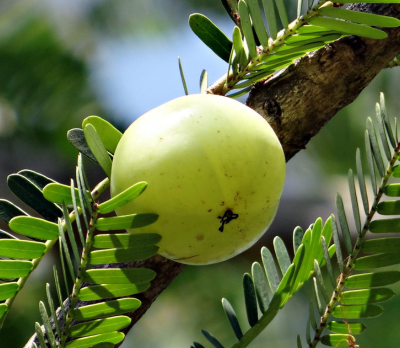
Amla (Emblica officinalis), or Indian Gooseberry, is a nutrient-rich fruit native to the Indian subcontinent and revered in Ayurveda for its wide-ranging health benefits. Used for centuries, it’s a staple in Indian households and herbal remedies. This small, sour fruit is packed with vitamin C, along with tannins, flavonoids, and polyphenols—giving it powerful antioxidant and anti-inflammatory properties. Amla supports immunity, digestion, and promotes healthy hair and skin, making it a vital component of traditional wellness practices.
Key Benefits
- Rich in Vitamin C: Amla is one of the richest natural sources of vitamin C, which helps boost immunity, fight infections, and promote overall health.
- Antioxidant Properties: It contains potent antioxidants like polyphenols, flavonoids, and tannins, which help neutralize free radicals and protect cells from oxidative damage.
- Enhances Digestive Health: Amla is known to support digestive health by improving digestion, relieving constipation, and reducing acidity.
- Promotes Hair Health: It is often used in hair care products and treatments due to its ability to nourish the scalp, strengthen hair follicles, and prevent premature graying and hair loss.
- Supports Skin Health: Amla's antioxidant properties help rejuvenate the skin, reduce signs of aging, and promote a clear and radiant complexion.
- Regulates Blood Sugar Levels: Some studies suggest that Amla may help regulate blood sugar levels and improve insulin sensitivity, making it beneficial for individuals with diabetes.
- Cardiovascular Health: Amla may help lower cholesterol levels, reduce blood pressure, and improve heart health by supporting healthy blood circulation and preventing the buildup of plaque in the arteries.
- Anti-inflammatory Effects: It exhibits anti-inflammatory properties, which can help reduce inflammation in the body and alleviate symptoms of inflammatory conditions like arthritis.
Cultivation:
Uttar Pradesh, Madhya Pradesh, Rajasthan, Gujarat, India
Extraction Process
has been standardized for: 20% Tannins using a 4:1 herb ratio for extraction
Clinical studies
Hypothyroidism: In a study involving 98 dyslipidemic patients, Amla extract was administered twice daily for 12 weeks, with a placebo group for comparison. Lipid profile analysis revealed significant reductions in total cholesterol (TC), triglyceride (TG), low-density lipoprotein cholesterol (LDL-C), and very low-density lipoprotein cholesterol (VLDL-C) in the Amla group compared to placebo. Additionally, the Amla group showed a 39% decrease in the atherogenic index of plasma (AIP) and a trend towards reducing the ratio of apolipoprotein B to apolipoprotein A1 (Apo B/Apo A1). While there was no notable change in Coenzyme Q10 (CoQ10) levels, amla extract showed potential hypoglycemic effects, albeit requiring further confirmation in larger studies. Overall, Amla extract demonstrated promise in reducing cholesterol and triglyceride levels, making it a potential treatment option for dyslipidemia, including in individuals with diabetes.
Antioxidant: In a randomized, double-blinded, placebo-controlled study, 99 healthy female subjects were divided into three groups and given lingonberry and amla fruit extract (LAE) drinks in different doses or a placebo for 12 weeks. The primary endpoint was skin elasticity, with secondary endpoints including skin thickness, stratum corneum water content, and degree of wrinkles around the eyes. After 12 weeks, LAE intake led to significant, dose-dependent improvements in skin elasticity (P < 0.01), skin thickness, stratum corneum water content, and degree of wrinkles (P < 0.001). These findings suggest that LAE could be a potential anti-aging agent for preventing skin weakening.
Antiaging: In this study, healthy aged human volunteers were given either Amalaki rasayana or a placebo for 45 days according to traditional methods. DNA repair in peripheral blood mononuclear cells was analyzed before and after rasayana administration, as well as after 45 days post-treatment. Results showed that Amalaki rasayana administration maintained or enhanced DNA strand break repair (DSBR) in aged individuals without adverse effects. However, there was no change in nucleotide excision repair (NER) or base excision repair (BER) activities. These findings suggest the potential benefits of Amalaki rasayana on DSBR and warrant further investigation
Ashwagandha
Latin Name: Withania Somnifera
Part Of Plant Used: Roots
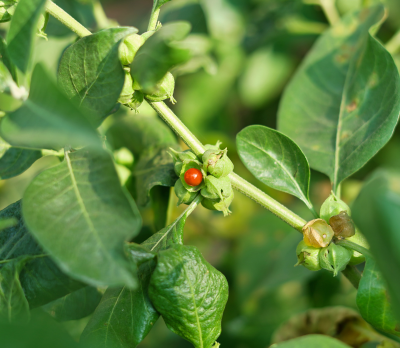
Ashwagandha (Withania Somnifera) is a well-known Ayurvedic herb, valued for its roots, leaves, and berries. The extract—light in color and bitter in taste—is derived from select, handpicked roots. Traditionally used for vitality and rejuvenation, Ashwagandha is also a powerful adaptogen, helping the body manage stress. Its active compounds, withanolides, provide steroidal lactones. Higher potency of withanolides in Ashwagandha means stronger effects.
Key Benefits
- Powerful antioxidant and immune booster
- Withanolides activate enzymes and macrophages (Th1 helper cells), that can engulf diseases before they manifest – defending the body against parasitic, bacterial and viral infections.
- Studies show that ashwagandha increases white blood cell counts, platelet counts, stem cells in the bone marrow and the amount and diversity of antibodies produced in the body.
- Its extracts have the ability to stimulate the production of nitric oxide in the body. This causes a dilatation of the blood vessels that carry blood to the genitals, leading to increased sexual desire.
- It helps increase the testosterone levels in men
- The neuro-protective qualities repel free radicals and prevent them from damaging cells in the brain. Age-related degenerative diseases can be prevented and longevity increased.
- Maintains heart health through its regulation of blood circulation. It helps to prevent blood clots, stabilises blood sugar and controls cholesterol levels in the body.
- It is one of the rare herbs with an adaptogenic property which is both energising and calming at the same time. It works holistically on the entire body to bring it back to homeostasis (internal balance) and help it to function efficiently. For example, it could provide energy to someone feeling sluggish or it can have a calming effect on the nerves of someone feeling tense and anxious.
Cultivation:
Northern states of India.
Extraction Process:
has been standardized for: 5% Withanolides No additives/carriers |100% water extracted |natural material| Non-GMO verified by NSF International (Certification No: C-128885-2020).
Drug Interactions:
Immunosuppressants [like azathioprine (Imuran), basiliximab (Simulect), cyclosporine (Neoral, Sandimmune), daclizumab (Zenapax), muromonab-CD3 (OKT3, Orthoclone OKT3), mycophenolate (CellCept), tacrolimus (FK506, Prograf), sirolimus (Rapamune), prednisone (Deltasone, Orasone), corticosteroids (glucocorticoids), and others.] and Sedatives (like clonazepam (Klonopin), diazepam (Valium), lorazepam (Ativan), and others.) have moderate interactions with Ashwagandha. Please consult with your physician before consuming Ashwagandha.Pregnant or breastfeeding women should not take ashwagandha.
Clinical studies
The roots of Withania somnifera consist primarily of compounds known as Withanolides, which are steroidal and bear a resemblance, both in their action and appearance, to the active constituents of Asian ginseng (Panax ginseng) known as ginsenosides.
Subclinical Hypothyroidism: Subclinical hypothyroidism, a thyroid disorder without obvious symptoms, affects 3%–8% of the global population. Ashwagandha (Withania somnifera), a traditional Ayurvedic medicine, is often used for thyroid dysfunctions. This pilot study aimed to evaluate the efficacy and safety of ashwagandha root extract in subclinical hypothyroid patients.Conducted at Sudbhawana Hospital in Varanasi, India, from May to September 2016, the study was a prospective, randomized, double-blind, single-center placebo-controlled trial. Fifty subjects aged 18 to 50 with elevated serum thyroid stimulating hormone (TSH) levels (4.5–10 mIU/L) were randomized into treatment (n = 25) or placebo (n = 25) groups for 8 weeks. The treatment group received ashwagandha root extract (600 mg daily), while the placebo group received starch.Results showed that ashwagandha significantly improved serum TSH (p < 0.001), T3 (p = 0.0031), and T4 (p = 0.0096) levels compared to placebo. Four subjects (two from each group) withdrew before the second visit. Ashwagandha treatment normalized thyroid indices significantly over the 8-week period. Mild and temporary adverse effects were reported by four subjects (8%)—one from the ashwagandha group and three from the placebo group.The study concluded that ashwagandha may be beneficial for normalizing thyroid indices in subclinical hypothyroid patients.
https:// doi.org/10.1089/acm.2017.0183
Stress and anxiety reduction: A Randomized Double-Blind, Placebo-Controlled Study of Safety and Efficacy of a High-Concentration Full-Spectrum Extract of Ashwagandha Root in Reducing Stress and Anxiety in Adults at Ashwins Health Care and Research Centre - Hyderabad, India, using a total of 64 subjects with a history of chronic stress, each enrolled into the study after performing relevant clinical examinations and laboratory tests. These included a measurement of serum cortisol, and assessing their scores on standard stress-assessment questionnaires. They were randomized to either the placebo control group or the study drug treatment group, and were asked to take one capsule twice a day for a period of 60 days. In the study drug treatment group, each capsule contained 300 mg of high-concentration full-spectrum extract from the root of the Ashwagandha plant. The treatment group that was given the high-concentration full-spectrum Ashwagandha root extract exhibited a significant reduction on all the stress-assessment scales on Day 60 than the placebo group. The serum cortisol levels were substantially reduced in the Ashwagandha group, than the placebo group.
Spermatogenic Activity: A two-arm, double-blind, randomized, placebo-controlled, parallel-group study with random allocation was conducted at five infertility centres in India under the guidelines of the Indian Council for Medical Research (ICMR-GCP), using 46 infertile men, all having a history of regular sexual intercourse over a one-year period with a gynecologically normal female partner with no apparent female infertility. The study subjects were randomized to either: (i) the placebo-treated group (25) or (ii) the Ashwagandha-treated group (21) that were administered one capsule (containing 225 mg of a high-concentration full-spectrum root extract of the Ashwagandha plant with a withanolide content of 5%) orally, thrice daily for a period of 12 weeks. The ashwagandha treated group testing with higher parameters of semen concentration and increased serum hormone levels than the placebo group.
https://www.hindawi.com/journals/ecam/2013/571420/
Male sexual health:There have been several studies on the effect of ashwagandha in male sexual health. The results have demonstrated that treatment of infertile men (with suboptimal levels of testosterone) with 5 grams per day of ashwagandha root extract significantly increased serum testosterone and luteinizing hormone levels and reduced the levels of follicle-stimulating hormone and prolactin compared to the control group. There was also a substantial increase in sperm count, concentration, and motility among infertile men. Another experimental study from 2016 also reported increased testosterone with M-A-T combo (Mucuna Pruriens, Ashwagandha and Tribulus Terrestris). M-A-T 1 group received 10 mg Mucuna, 10 mg Ashwagandha and 10 mg Tribulus, while M-A-T 2 received 20g of each. Both groups had considerable increased testosterone, follicle-stimulating hormone and luteinizing hormone levels.
Brahmi
Latin Name: Bacopa monnieri
Part Of Plant Used:Whole herb

Brahmi (Bacopa monnieri) is an ancient Ayurvedic herb known for its wide range of health benefits. Native to India’s wetlands, this creeping herb with succulent leaves and white flowers has long been used to enhance memory, focus, and overall well-being. Traditionally valued for enhancing cognitive function, reducing anxiety, and promoting mental clarity, Brahmi contains bacosides—active compounds that support brain health. Its adaptogenic properties help manage stress and support balanced mental performance. Available as a tea, extract, or supplement, Brahmi continues to be a go-to herb for learning, concentration, and emotional balance.
Key Benefits
- Cognitive Enhancement: Brahmi is renowned for its ability to support cognitive function, including memory, concentration, and learning ability. It may help improve mental clarity and focus.
- Stress Reduction: Brahmi is considered an adaptogen, meaning it may help the body adapt to stress and promote a sense of calmness and relaxation. It may reduce symptoms of anxiety and promote overall mental well-being.
- Neuroprotection: The active compounds in Brahmi, such as bacosides, have antioxidant properties that may help protect brain cells from damage caused by free radicals. This neuroprotective effect may support long-term brain health.
- Mood Regulation: Some research suggests that Brahmi may have antidepressant effects and could help stabilize mood. It may contribute to feelings of happiness and emotional balance.
- Anti-inflammatory Properties: Brahmi contains compounds with anti-inflammatory properties that may help reduce inflammation in the body. This could potentially benefit conditions associated with inflammation, such as arthritis.
- Cardiovascular Support: Preliminary studies suggest that Brahmi may have cardioprotective effects, including the ability to lower blood pressure and cholesterol levels. This could contribute to heart health.
- Digestive Health: Brahmi has traditionally been used to support digestive function and relieve gastrointestinal discomfort. It may help improve digestion and reduce symptoms such as bloating and indigestion.
Cultivation:
Kerala, Maharashtra, Tamil Nadu, Uttar Pradesh, India
Extraction Process:
was carried out for 23% triterpene glycosides containing major 5 bacoside using a 8:1 herb ratio.Non-irradiated and not treated with ETO | Kosher & Halal Certifications | GMO Free | BSE/TSE Free
Clinical studies
As a Thyroid stimulant:
A 19-year-old female patient presented at the Outpatient department of NRIUMSD, Hyderabad, with symptoms indicative of hypothyroidism, including weight gain, hair loss, poor appetite, and weakness. She underwent treatment with Unani medicines, specifically Asgand (Withania somnifera) and Brahmi (Bacopa monnieri), for a duration of 8 weeks. Before and after the treatment, comprehensive blood and urine tests, including thyroid profile tests, were conducted. After 8 weeks, the patient experienced significant symptom relief, evidenced by a decrease in Zulewski's clinical score from 7/12 to 4/12 and a decline in TSH levels from 6.73 μ IU/mL to 2.53 μ IU/mL. Notably, serum T3 and T4 levels remained within the normal range throughout the treatment period. These findings suggest that Unani medicine could be an effective approach for managing hypothyroidism.
Coleus
Latin Name: Coleus forskohlii
Part Of Plant Used: Roots

Coleus forskohlii is a perennial herb from the mint family, Lamiaceae, native to warm regions like India, Burma, and Thailand. Recognizable by its large, fragrant leaves and lavender flowers, its roots are the most valuable part—rich in forskolin, the compound behind its medicinal power. Forskolin activates the enzyme adenylate cyclase, boosting cAMP levels in cells and triggering various beneficial effects. Traditionally, Coleus forskohlii has been used to support heart health, respiratory function, and weight management, making it a versatile herbal supplement.
Key Benefits
- Fat Breakdown: Forskolin, the active compound in Coleus forskohlii, activates adenylate cyclase, which increases levels of cyclic AMP (cAMP) in cells. Higher cAMP levels can enhance the breakdown of stored fats, aiding in weight loss.
- Metabolism Boost: Increased cAMP levels can also boost metabolism, helping the body to burn calories more efficiently.
- Improved Heart Function: Forskolin can enhance the force of heart contractions, which is beneficial for heart function and can help treat heart failure.
- Blood Pressure Regulation: It may help lower blood pressure by relaxing the smooth muscles in blood vessels, leading to improved blood flow.
- Asthma Relief: Forskolin can relax the muscles around the bronchial tubes, making breathing easier. This is particularly beneficial for individuals with asthma and other respiratory conditions.
- Bronchodilation: The relaxing effect on the bronchial muscles can help alleviate symptoms of bronchitis and other lung conditions.
- Glaucoma Management: Forskolin has been shown to reduce intraocular pressure, which can be beneficial for individuals with glaucoma or those at risk of developing the condition.
- Reduction in Inflammation: Forskolin has anti-inflammatory properties, which can help reduce inflammation and alleviate symptoms of various inflammatory conditions.
- Cancer Research: Preliminary studies suggest that forskolin may have anti-cancer properties, potentially inhibiting the growth of cancer cells. However, more research is needed to fully understand its efficacy in this area.
- Thyroid Hormone Production: Forskolin may stimulate the release of thyroid hormones, which can help regulate metabolism and energy levels.
- Neuroprotection: Some studies indicate that forskolin may have neuroprotective effects, potentially improving memory and cognitive function, although more research is needed in this area.
- Blood Sugar Levels: Forskolin may help regulate blood sugar levels, which is beneficial for individuals with diabetes or at risk of developing diabetes.
- Lipid Profile Improvement: It may also improve lipid profiles by reducing levels of LDL cholesterol and triglycerides.
Cultivation:
Tamil Nadu, Karnataka, Andhra Pradesh, India
Extraction Process:
has been standardized for: 10% Forskolin using Herb ratio of 22:1Non-Irradiated | Non-GMO | Allergen free| Natural Origin| TSE-BSE free | Melamine free | Suitable for vegan and vegetarian | Paraben free
Drug Interactions:
Antihypertensive like Atenolol, Lisinopril, Amlodipine, Hydrochlorothiazide; Anticoagulant like Warfarin, Heparin, Clopidogrel, Aspirin; Vasodilators like Nitroglycerin, Isosorbide dinitrate; Immunosuppressant like Cyclosporine, Tacrolimus.
Clinical studies
Conversion of T4 to T3: T4, a major thyroid gland secretion, needs conversion to T3 by iodothyronine deiodinase (DII) to be biologically active. Unexpectedly, DII expression was found in human skeletal muscle tissue. This study identified DII activity and mRNA in cultured human skeletal muscle cells, examining the regulation mechanisms of DII expression. The deiodinating activity in these cells matched DII's known properties. Northern analysis showed DII mRNA (approx. 7.5 kb) in the muscle cells. DII mRNA and activity increased rapidly with (Bu)2cAMP, forskolin, or β-adrenergic agonists. DII expression was negatively regulated by thyroid hormones and tumor necrosis factor-α (TNF-α). Interleukin-1β and interleukin-6 did not affect DII expression. This research demonstrated that DII is present in human skeletal muscle cells and that its expression is stimulated by β-adrenergic mechanisms through a cAMP-mediated pathway, while thyroid hormones and TNF-α inhibit it.
Weight Management: In a 12-week randomized, double-blind, placebo-controlled study, the effects of forskolin on body composition, testosterone levels, metabolic rate, and blood pressure were investigated in overweight and obese men with a BMI of 26 kg/m² or higher. Thirty male participants were divided into two groups, with 15 receiving forskolin and 15 receiving a placebo. The results revealed significant changes in body composition among the forskolin group, with notable decreases in body fat percentage (BF%) and fat mass (FM) compared to the placebo group (p < 0.05). Additionally, forskolin supplementation led to a significant increase in bone mass over the 12-week period (p < 0.05), with a trend towards an increase in lean body mass (p = 0.097). Serum free testosterone levels showed a substantial rise in the forskolin group compared to placebo (p < 0.05), while total testosterone levels demonstrated a 16.77% increase in the forskolin group versus a 1.08% decrease in the placebo group, although this difference was not statistically significant. The forskolin extract was orally administered at 250 mg of 10% concentration twice daily. These findings suggest that forskolin may serve as a promising therapeutic agent for managing obesity, with potential benefits for body composition and testosterone levels in overweight and obese men.
cAMP on TSH:Chronic treatment of cultured thyroid cells with l-10 PM forskolin (forskolin-treated cells) results in the sensitization of adenylate cyclase response to further acute stimulation by 100 PM forskolin or 10 mu/ml thyrotropin (TSH). This positive regulation, akin to that induced by 0.1 mu/ml TSH (TSH-treated cells), occurs between 2 and 3 days of culture. Unlike chronic treatment with TSH, which leads to refractoriness beyond 0.1 mU/ml, forskolin-treated cells remain responsive to TSH. Furthermore, the acute response to TSH or forskolin in cells treated for 4 days with forskolin intensifies with the concentration of forskolin used during chronic treatment. When both agonists are combined, their acute effect is additive on control, TSH- and forskolin-treated cells. Additionally, chronic treatment with l-10 PM forskolin, like 0.1 mu/ml TSH, induces a chronic phospholipid effect characterized by increased incorporation of 32Pi into phosphatidylinositol (PI) and phosphatidic acid. However, the acute challenge with 100 PM forskolin in these cells elicits a reverse phospholipid effect, indicating decreased incorporation of 32Pi into PI. Conversely, acute stimulation of TSH-treated cells with TSH produces a reverse phospholipid effect, while acute stimulation of forskolin-treated cells with TSH yields a normal phospholipid effect as seen in control cells. These findings suggest a reciprocal regulation pattern between the observed effects of TSH on cAMP accumulation and phospholipid turnover, indicating a complex interplay between forskolin, TSH, and their downstream signaling pathways in cultured thyroid cells.
Vrikshamla
Latin Name: Garcinia cambogia
Part Of Plant Used: Fruit
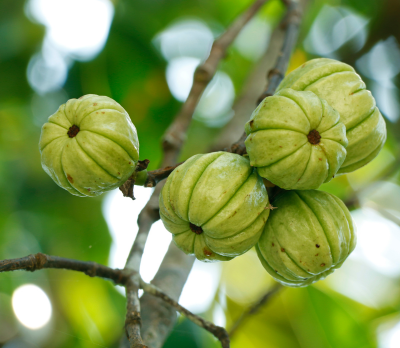
Garcinia cambogia, also known as Malabar tamarind or brindleberry, has a long history of traditional use and scientific interest due to its medicinal properties and nutrient-rich profile. Native to Southeast Asia, it is known for its potential health benefits. Its active compound, hydroxycitric acid (HCA), is widely studied for supporting weight management and appetite suppression. HCA is believed to block citrate lyase, an enzyme that helps convert carbohydrates into fat, which may aid in fat loss. Garcinia cambogia is also rich in antioxidants, helping to boost immunity and reduce oxidative stress. Traditionally, it has been used to support gastrointestinal health and overall well-being, making it a versatile herb with benefits for health and vitality.
Key Benefits
- Weight Management: Garcinia cambogia extract, particularly its active ingredient hydroxycitric acid (HCA), is believed to inhibit the enzyme citrate lyase, which plays a role in fat production. This may help support weight loss efforts by reducing the conversion of carbohydrates into fat and suppressing appetite.
- Appetite Suppression: HCA may also increase serotonin levels in the brain, leading to feelings of fullness and reduced appetite. This can help control cravings and prevent overeating, contributing to weight management goals.
- Improved Metabolism: Some studies suggest that Garcinia cambogia extract may enhance metabolism, potentially leading to increased calorie burning and improved energy levels.
- Blood Sugar Regulation: Research indicates that Garcinia cambogia may help regulate blood sugar levels by improving insulin sensitivity, which could be beneficial for individuals with diabetes or those at risk of developing the condition.
- Cholesterol Management: Garcinia cambogia extract may have a positive effect on lipid profiles, including reducing LDL ("bad") cholesterol levels and increasing HDL ("good") cholesterol levels, thereby supporting heart health.
- Antioxidant Properties: Garcinia cambogia contains antioxidants that help neutralize free radicals and reduce oxidative stress, which can protect cells from damage and support overall health.
- Digestive Health: Traditionally, Garcinia cambogia has been used to promote digestive health and alleviate gastrointestinal discomfort, such as bloating and constipation.
Cultivation:
Kerala, Karnataka, Tamil Nadu, India
Extraction Process
was carried out for 54% Hydroxy Citric Acid using a 5:1 herb ratio.
Clinical studies
Fat metabolism: In a twelve-week randomized, double-blind, placebo-controlled trial conducted in an outpatient weight control research unit, the efficacy of Garcinia cambogia for body weight and fat mass loss in overweight human subjects was evaluated. The participants, overweight men and women with a mean body mass index of approximately 32 kg/m², were randomly assigned to receive either an active herbal compound containing 1500 mg of hydroxycitric acid per day or a placebo, alongside a high-fiber, low-energy diet. Throughout the twelve-week treatment period, body weight was monitored every other week, while fat mass was measured at the beginning and end of the trial. Results revealed that although both groups experienced significant weight loss over the treatment duration (P<.001), there were no statistically significant differences in weight loss between the two groups (mean [SD] weight loss of 3.2 [3.3] kg in the active hydroxycitric acid group vs. 4.1 [3.9] kg in the placebo group; P = .14). Moreover, there were no significant variations in the estimated percentage of body fat mass loss between the treatment groups, indicating that Garcinia cambogia did not yield significant weight loss or fat mass reduction compared to the placebo. Therefore, the study concluded that Garcinia cambogia failed to demonstrate significant efficacy in producing weight loss or fat mass loss beyond that observed with a placebo.
Improving satiety: The study aimed to assess the effects of a nutraceutical product comprising Garcinia cambogia, l-carnitine, and Ascophyllum nodosum extract on subjective satiety sensations and food preferences in healthy volunteers. In a crossover design, 28 participants (21 females and 7 males, aged 31 ± 5, BMI 22.6 ± 1.7) were randomly assigned to receive either the active treatment (LIS) or placebo (PL) over one week. Following each treatment period, participants consumed an ad libitum test meal, and their food preferences and appetite sensations were evaluated using various measures. Results showed no significant difference in energy intake between the study groups. However, LIS was associated with reduced subjective hunger sensations (p = 0.018) and increased ratings of satiety (p = 0.02) and fullness (p = 0.01). The preference for high-fat foods decreased after the test meal in both groups. Notably, LIS treatment led to an increase in preference for sweet foods relative to savory foods (p = 0.03 and p = 0.004, respectively), indicating an effect on food explicit liking and implicit wanting. These findings suggest that the nutraceutical containing Garcinia cambogia, Ascophyllum nodosum extract, and l-carnitine may have satiating properties and could serve as an appetite modulator.
Hypolipemic: This study aimed to investigate the effects of Garcinia cambogia on the lipid profile, endocrine, calorimetric, and anthropometric parameters in obese women. Garcinia cambogia, containing hydroxycitric acid (HCA) known for inhibiting ATP-citratelyase and potentially blocking lipogenesis, is believed to promote weight reduction and improve lipid profiles. Thirty obese women (BMI > 25 kg/m²; aged 25-60 years) were divided into treated (n = 30) and control (n = 13) groups. The treated group received 2.4 g (800 mg 3×/day) of Garcinia extract (50% HCA) for 60 days alongside dietary control, while the control group received a placebo. Various parameters including weight, BMI, waist-hip ratio, percentage of fat mass, resting metabolic rate, respiratory coefficient, triglycerides (TG), total cholesterol, HDL, LDL, leptin, and insulin serum levels were evaluated. Results showed a significant reduction in TG levels in the treated group compared to placebo (p = 0.0002), with a distinct post-treatment variation (p = 0.04). However, no significant changes were observed in other lipid profile variables, anthropometric measures, or calorimetric parameters. Additionally, leptin and insulin levels remained unchanged after treatment. The findings suggest that short-term treatment with Garcinia cambogia exhibited a hypotriglyceridemic effect, which appeared independent of changes in leptin levels.
Kalonji
Latin Name: Nigella sativa
Part Of Plant Used: Seeds
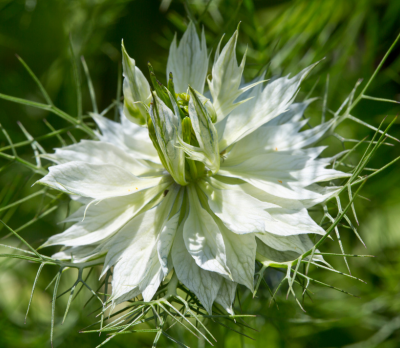
Kalonji (Nigella sativa) is a prized herb in traditional medicine, especially Ayurveda. Its small, dark seeds are packed with medicinal value, and the extract, made from carefully selected seeds, is known for its powerful healing properties. Rich in antioxidants, Kalonji helps combat oxidative stress and protects cells from damage. Its key compound, thymoquinone, offers strong antioxidant and anti-inflammatory effects. Kalonji seed extract also supports immune health, aids digestion, and promotes healthy skin.
Key Benefits
- Antioxidant Properties: Kalonji seeds are rich in antioxidants like thymoquinone, which help neutralize harmful free radicals in the body, reducing oxidative stress and lowering the risk of chronic diseases.
- Anti-inflammatory Effects: The compounds found in kalonji seeds have potent anti-inflammatory properties, which can help reduce inflammation in the body and alleviate symptoms of inflammatory conditions such as arthritis and asthma.
- Immune System Support: Kalonji seeds are known to support immune function by enhancing the activity of immune cells and promoting overall immune health. They may help the body fight off infections and diseases more effectively.
- Digestive Health: Kalonji seeds have been traditionally used to aid digestion and alleviate digestive issues such as bloating, gas, and indigestion. They can help promote healthy digestion and relieve discomfort.
- Heart Health: Kalonji seeds may have beneficial effects on heart health by helping to lower cholesterol levels, reduce blood pressure, and improve overall cardiovascular function. They may also help prevent the development of heart disease.
- Blood Sugar Regulation: Some research suggests that kalonji seeds may help regulate blood sugar levels and improve insulin sensitivity, making them potentially beneficial for individuals with diabetes or at risk of developing diabetes.
- Skin and Hair Health: Kalonji seeds contain vitamins, minerals, and fatty acids that are beneficial for skin and hair health. They may help reduce acne, promote healthy skin aging, and strengthen hair follicles, leading to healthier skin and hair.
- Respiratory Health: Kalonji seeds have been used traditionally to support respiratory health and alleviate symptoms of respiratory conditions such as asthma, bronchitis, and coughs. They may help improve lung function and reduce inflammation in the airways.
Cultivation:
Central -Western states of India.
Extraction Process
has been standardized for: 5.85% Thymoquinone No additives/carriers |100% SCF extracted |natural material| Non-GMO verified by NSF International (Certification No: C-128885-2020).
Certifications:
ISO22000:2005 | GMP | Halal | Kosher | NSF
Drug Interactions:
Diabetic medications like insulin, metformin, glipizide, and pioglitazone; antihypertensives like lisinopril, losartan, amlodipine, and hydrochlorothiazide; anticoagulants like warfarin (Coumadin), aspirin, clopidogrel (Plavix), and heparin; immunosuppressants like azathioprine (Imuran), cyclosporine (Neoral), tacrolimus (Prograf), and mycophenolate (CellCept) have moderate interaction with kalonji seeds. Please consult with your physician before consuming Kalonji. Pregnant or breastfeeding women should not take kalonji.
Clinical studies
The primary active compounds in Kalonji seed extract are Thymoquinone, Thymohydroquinone, and Dithymoquinone. These bioactive constituents are responsible for many of Kalonji's therapeutic properties and are known for their antioxidant, anti-inflammatory, and immune-modulating effects.
Reduction of oxidative stress: The study aimed to investigate the effects of powdered Nigella sativa (black cumin) seeds on markers of oxidative stress, endothelial dysfunction, and serum lipids in patients with Hashimoto's thyroiditis. Forty patients were randomly assigned to receive either powdered N. sativa or a placebo daily for 8 weeks. Results showed that treatment with N. sativa led to significant increases in total antioxidant capacity (TAC) and superoxide dismutase (SOD), along with reductions in malondialdehyde (MDA) levels. Additionally, N. sativa treatment resulted in a decrease in serum levels of vascular cell adhesion molecule (VCAM)-1, body mass index, low-density lipoprotein cholesterol, and triglycerides, while high-density lipoprotein cholesterol increased. These findings suggest that powdered black cumin seeds may have therapeutic potential in improving oxidative stress, endothelial dysfunction, and metabolic abnormalities associated with Hashimoto's thyroiditis.
https://doi.org/10.1016/j.clnesp.2020.02.015
Antiinflammatory Activity: The study aimed to assess the effects of Nigella sativa on thyroid function, serum Vascular Endothelial Growth Factor (VEGF) – 1, Nesfatin-1, and anthropometric features in patients with Hashimoto's thyroiditis.Forty patients with Hashimoto's thyroiditis participated in an 8-week trial, randomly assigned to receive powdered Nigella sativa or a placebo daily. Changes in anthropometric variables, dietary intakes, thyroid status, serum VEGF, and Nesfatin-1 concentrations were measured.Results revealed that Nigella sativa treatment led to significant reductions in body weight and body mass index (BMI). Serum thyroid stimulating hormone (TSH) and anti-thyroid peroxidase (anti-TPO) antibodies decreased, while serum T3 concentrations increased in the Nigella sativa-treated group. Additionally, there was a significant reduction in serum VEGF concentrations in the intervention group, whereas no such changes were observed in the placebo-treated group. Changes in waist to hip ratio (WHR) and thyroid hormones were significant predictors of changes in serum VEGF and Nesgfatin-1 values in the Nigella sativa-treated group.In conclusion, the study demonstrated significant beneficial effects of powdered Nigella sativa in improving thyroid status and anthropometric variables in patients with Hashimoto's thyroiditis. Moreover, Nigella sativa reduced serum VEGF concentrations in these patients. These findings suggest that Nigella sativa could be a valuable therapeutic approach in managing Hashimoto's thyroiditis by ameliorating disease severity.
https:// doi.org/10.1186/s12906-016-1432-2
Asthma: Non-compliance with conventional asthma medications remains a significant challenge in achieving asthma control. Nigella sativa oil (NSO), traditionally used for inflammatory conditions like asthma, was investigated for its benefits on asthma clinical and inflammatory parameters. In a randomized, double-blind, placebo-controlled trial, asthmatics were given NSO capsules (500 mg, twice daily) as supplementary treatment for 4 weeks. Primary outcome was Asthma Control Test score, with secondary outcomes including pulmonary function tests, blood eosinophils, and total serum Immunoglobulin E.Between June and December 2015, 80 asthmatics were enrolled, with 40 patients in each treatment and placebo groups. After 4 weeks, ten patients withdrew from each group. Results showed that compared to placebo, the NSO group exhibited a significant improvement in mean Asthma Control Test score (21.1 vs. 19.6, p = 0.044) and a significant reduction in blood eosinophils (-50 vs. 15 cells/μL, p = 0.013). NSO also showed a trend in improving forced expiratory volume in 1 second as a percentage of predicted value, though not statistically significant (p = 0.170).This trial suggests that NSO supplementation can enhance asthma control and potentially improve pulmonary function, highlighting its potential as an adjunctive therapy for asthma management. https:// doi.org/10.1002/ptr.5761
Antihypertensive: This meta-analysis aimed to investigate the effects of Nigella Sativa (N. sativa) supplementation on blood pressure in adults, considering conflicting findings from previous clinical studies. PubMed, Cochrane Library, Web of Science, Scopus, Embase databases, and Google Scholar were searched up to August 2022. A random-effects model was used to analyze weighted mean differences (WMDs), with nonlinear dose-response analysis and meta-regression conducted.Results showed that N. sativa supplementation effectively reduced both systolic (WMD: -3.06 mmHg; 95% CI: -3.89 to -2.22, p < 0.001; I2 = 84.7%, p < 0.001) and diastolic blood pressure (WMD = -2.69 mmHg; 95% CI: -3.72, -1.66, p < 0.001; I2 = 97.3%, p < 0.001). The meta-analysis concluded that N. sativa supplementation can improve blood pressure levels, suggesting its potential as an effective approach to blood pressure management.
https:// doi.org/10.1002/ptr.7891
Kelp
Latin Name: Laminaria digitata
Part Of Plant Used: Whole

Kelp (Laminaria digitata) is a large brown seaweed found in shallow ocean waters, known for its impressive nutrient profile and wide-ranging uses. It’s rich in minerals like iodine, calcium, magnesium, and potassium, and packed with vitamins A, C, E, and K. Its high iodine content makes it especially valuable for supporting thyroid function. Kelp contains alginate, a natural polysaccharide responsible for its gelatinous texture, commonly used as a thickening and stabilizing agent in food—similar to agar agar. Traditionally, kelp has been used to support thyroid health, boost metabolism, and aid digestion.
Key Benefits
- Rich Source of Iodine: Kelp is an excellent natural source of iodine, essential for healthy thyroid function. Adequate iodine intake helps regulate metabolism and supports overall hormonal balance.
- Nutrient-Dense: Kelp is packed with essential vitamins and minerals, including calcium, magnesium, potassium, iron, and vitamins A, C, E, and K. These nutrients contribute to various bodily functions and overall health.
- Supports Metabolism: Due to its high iodine content, kelp helps boost metabolic rate, which can aid in weight management and energy production.
- Promotes Digestive Health: The high fiber content in kelp aids in digestion and acts as a natural laxative, helping to prevent constipation and promote regular bowel movements.
- Antioxidant Properties: Kelp contains antioxidants such as fucoxanthin, which help protect cells from oxidative damage and reduce inflammation in the body.
- Bone Health: Rich in calcium and magnesium, kelp supports strong bones and teeth, contributing to overall skeletal health.
- Heart Health: The potassium and other minerals in kelp can help regulate blood pressure and support cardiovascular health.
- Detoxification: Kelp's alginate content can bind to heavy metals and toxins in the body, aiding in their removal and promoting detoxification.
- Skin Health: Kelp is used in skincare products for its hydrating and anti-inflammatory properties, helping to soothe and moisturize the skin.
- Weight Management: Low in calories and high in nutrients, kelp is an excellent addition to weight loss diets. Its fiber content also helps promote a feeling of fullness, reducing overall calorie intake.
Cultivation:
Tamil nadu, Gujarat, Maharashtra, India
Manufacturing Process
has been standardized for: 20% Iodine
Clinical studies
- Source of Iodine in Thyroid patient: A double-blind trial with 36 healthy subjects, divided into placebo, low-dose kelp (2 kelp capsules/day), and high-dose kelp (4 kelp capsules/day) groups for 4 weeks. Measurements included TSH, free thyroxine, total triiodothyronine, TRH stimulation response, urinary iodine excretion, and basal metabolic rate. TSH increased significantly in both kelp groups (low-dose P = 0.04; high-dose P = 0.002), but not in the placebo group. Free thyroxine decreased slightly with placebo but remained unchanged with kelp. Total triiodothyronine decreased significantly only with high-dose kelp (P = 0.04). TRH stimulation test showed a significant increase in TSH with high-dose kelp (P = 0.0002). Urinary iodine excretion increased dose-dependently with kelp. Basal metabolic rate was unchanged across all groups. Thyroid values returned to baseline 2 weeks post-supplementation, except for TSH in the high-dose group. Short-term kelp supplementation significantly increases TSH levels. Further studies are needed to assess the long-term impact on thyroid health.
- Hypothyroid treatment: A study was conducted to evaluate the effects of iodine-reduced kelp (Laminaria japonica) powder on body fat composition in overweight Japanese subjects. This randomized, double-blind, placebo-controlled intervention involved 50 participants with a BMI between 25 and 30 kg/m². Participants were randomly assigned to take 30 tablets per day (10 tablets, 3 times a day) containing either kelp powder (6 g kelp powder, providing 3 g alginate daily) or a placebo for 8 weeks. Measurements of body composition, blood lipids, and thyroid hormone levels were taken before and after the intervention. Male subjects in the kelp group showed a significant decrease in body fat percentage compared to the placebo group. There was a trend towards reduced body weight (p = 0.065) and BMI (p = 0.072) in males from the kelp group. No significant changes in body composition or visceral fat were observed in female subjects. Serum thyroid hormone levels remained stable despite the iodine intake of 1.03 mg/day from kelp.Iodine-reduced kelp powder significantly reduced body fat percentage in overweight male subjects without affecting thyroid function. The high alginate content in kelp may help prevent obesity in individuals with a high dietary intake of iodine from seaweed.

























